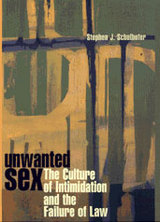


Despite three decades of intense scrutiny and repeated attempts at ambitious reform, our laws against rape and sexual harassment still fail to protect women from sexual overreaching and abuse. What went wrong? In this original, provocative, and enlightening work, Stephen Schulhofer, a distinguished scholar in criminal law, shows the need to refocus our laws against rape and to create a new system of legal safeguards against interference with sexual autonomy.
Our laws provide comprehensive protection for property rights, labor, and other important interests, but sexual autonomy—the right to choose freely whether and when to be sexually intimate with another person—is devalued and ignored. With vivid examples, including stranger assaults, date rapes, and sexual encounters between job supervisors and subordinates, teachers and students, doctors and patients, lawyers and clients, Schulhofer shows that recent reforms of rape and sexual harassment law are overrated and inadequate. From the excessive degree of force necessary for an aggressive action to be defined as rape, to the gray areas in which coercion and exploitation can be used to elicit a false but legally valid “consent,” Schulhofer offers a clear analysis of the limits of current standards. His proposals for a radically different approach hold the promise of genuine respect and effective protection for the sexual autonomy of both women and men. It is an ambitious yet sensible vision, committed to allowing willing partners to seek consensual relationships, while fully protecting each person’s right to refuse sexual encounters that are not genuinely desired.
READERS
Browse our collection.
PUBLISHERS
See BiblioVault's publisher services.
STUDENT SERVICES
Files for college accessibility offices.
UChicago Accessibility Resources
home | accessibility | search | about | contact us
BiblioVault ® 2001 - 2024
The University of Chicago Press









